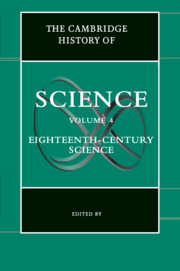Book contents
- Frontmatter
- 1 Introduction
- Part I Science and Society
- Part II Disciplines
- Part III Special Themes
- 22 Eighteenth-Century Scientific Instruments and Their Makers
- 23 Print and Public Science
- 24 Scientific Illustration in the Eighteenth Century
- 25 Science, Art, and the Representation of the Natural World
- 26 Science and Voyages of Discovery
- Part IV Non-Western Traditions
- Part V Ramifications and Impacts
- Index
- References
26 - Science and Voyages of Discovery
from Part III - Special Themes
Published online by Cambridge University Press: 28 March 2008
- Frontmatter
- 1 Introduction
- Part I Science and Society
- Part II Disciplines
- Part III Special Themes
- 22 Eighteenth-Century Scientific Instruments and Their Makers
- 23 Print and Public Science
- 24 Scientific Illustration in the Eighteenth Century
- 25 Science, Art, and the Representation of the Natural World
- 26 Science and Voyages of Discovery
- Part IV Non-Western Traditions
- Part V Ramifications and Impacts
- Index
- References
Summary
Natural history and geographical knowledge were transformed in the eighteenth century by means of the systematic analysis of virtually all the accessible parts of the planet. From the 1760s onward, the nature of voyages with a broadly scientific goal underwent a rapid evolution. Although some degree of international cooperation was necessary to achieve this change, the increasing mastery of the Pacific was overshadowed by vigorous competition in the same area among the major European powers. Recently there has been an explosion of interest in this development, in particular among scholars located on the Pacific Rim, and the great voyages of the late eighteenth century have been linked to a number of political, imperial, and commercial contexts. Ostensibly scientific missions were usually accompanied by a set of instructions regarding the discovery of either the Northwest Passage, which was supposed to offer a northern entrance into the Pacific, or of terra australis incognita, an area that since classical times had been posited as necessary to “balance” the putative excess of land in the Northern hemisphere. In this chapter I survey the major explorations of the century and analyze their broad achievements in a diversity of scientific fields such as ethnography, botany, cartography, and zoology. I argue that the scientific motives behind these forays were usually bound up with, and often inextricably part of, the strategic concerns of governments in Britain, France, Russia, and Spain.
- Type
- Chapter
- Information
- The Cambridge History of Science , pp. 618 - 646Publisher: Cambridge University PressPrint publication year: 2003
References
- 6
- Cited by

